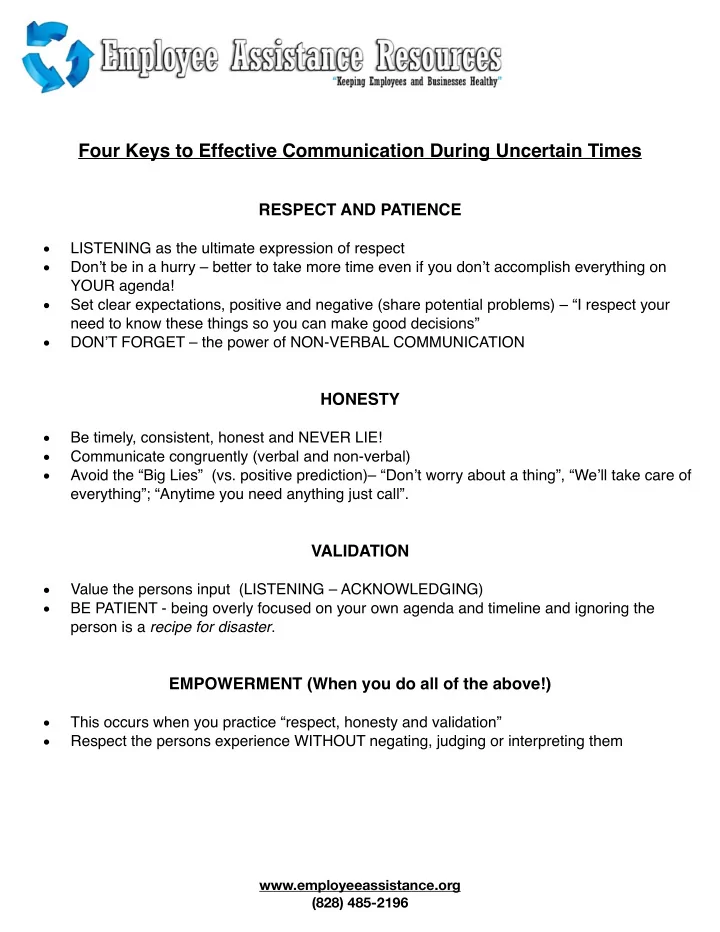

Four Keys to Effective Communication During Uncertain Times RESPECT AND PATIENCE • LISTENING as the ultimate expression of respect • Don’t be in a hurry – better to take more time even if you don’t accomplish everything on YOUR agenda! • Set clear expectations, positive and negative (share potential problems) – “I respect your need to know these things so you can make good decisions” • DON’T FORGET – the power of NON-VERBAL COMMUNICATION HONESTY • Be timely, consistent, honest and NEVER LIE! • Communicate congruently (verbal and non-verbal) • Avoid the “Big Lies” (vs. positive prediction)– “Don’t worry about a thing”, “We’ll take care of everything”; “Anytime you need anything just call”. VALIDATION • Value the persons input (LISTENING – ACKNOWLEDGING) • BE PATIENT - being overly focused on your own agenda and timeline and ignoring the person is a recipe for disaster . EMPOWERMENT (When you do all of the above!) • This occurs when you practice “respect, honesty and validation” • Respect the persons experience WITHOUT negating, judging or interpreting them www.employeeassistance.org (828) 485-2196
Helping Remaining Employees Remember that remaining employees will also be in distress • Grief and Loss • Insecurity regarding their future • Fear and anxiety • Anger/Helplessness • Distracted/Preoccupied = Temporary decrease in productivity • Increased need for support and information • Increased need to process their feelings Advice for Newly Remote Workers Minimize distractions • Choose a work-space separated from household noises and activities • Create news and information free times • Set goals and boundaries • Consider sharing goals with coworkers or family members • Study's show remote workers log more hours than office-based counterparts • Need to establish clear boundaries between home and work lives • Make a communication plan • Make specific arrangements for when and how communication will occur with colleagues • Seek social connection • There's a tendency for remote workers to experience social isolation • Stay connected to coworkers, managers and customers - use video formats • www.employeeassistance.org (828) 485-2196
Helping Leaders Maximize Trust and Minimize Stress • Manage your own stress • It's important that leaders appear calm, deliberate and are making careful decisions • Share information with empathy and optimism • It's important to recognize the uncertainty/anxiety that people are experiencing • Use credibility to build trust • Expertise and dependability • Do what you say! • Be honest and transparent • Need to deliver disappointing news honestly and clearly • Provide regular communications • Provide a forum for feedback • Be a role model www.employeeassistance.org (828) 485-2196
Coping Strategies for Employers and Employees Effectively managing stress and anxiety Use Your Resources Be sure to provide employees with contact information for your Employee Assistance Program (EAP) and insurance carrier for mental health benefits. Also, your EAP may be able to assist by providing on-site Critical Incident Response to assist employees manage the stress of our current challenges. Name It and Tame It • What are you actually worried about? • Make a list • Get thoughts OUT of your head and look at it! • Realistically assess the likelihood of each threat • Realistically assess how it would impact you • Break the list down into categories • What can I control • What can't I control Change What You Can • Problem-Focused Coping Strategies • I can't be sure that there's any exposure to the virus in my home but we can put in place a plan to wash our hands and clean usable surfaces regularly, etc. • Make a plan and make a backup plan. • Recognize no plan is perfect • Mental preparation means we can think when were not in crisis • Mental preparation helps us feel that we can control some things and helps reduce anxiety www.employeeassistance.org (828) 485-2196
Accept What You Can't Change • Recognize and accept there are some things that are out of our control • Use Emotion-Focused Coping Strategies • Cognitive reframing • Mindfulness • Exercise • Books, games, TV show, baking, etc. etc. • Don't just sit there and worry DO SOMETHING! • Lego projects, puzzles Choose Your News Carefully • Staying informed can be important but don't make it your primary focus • Choose a single new source that is reputable, set a schedule (limited) • Do not leave the news on all day or keep monitoring it for the latest information • Social media is a great way to stay connected for social support • Social media is often a terrible place for reputable information • Consider using the CDC website Don't Judge Yourself, or Others • Everyone is different, be respectful and understanding. • You don't know what someone else has been through • Previous trauma, death in the family, financial stress, mental illness Stay Connected • Social support is really critical in difficult times. • Be creative. • Regularly scheduled calls • Zoom family meetings • Outside get-togethers www.employeeassistance.org (828) 485-2196
Resources Coping With Stress During Infectious Disease Outbreaks https://store.samhsa.gov/product/Coping-with-Stress-During-Infectious-Disease-Outbreaks/sma14-4885 Coronavirus Anxiety: Coping With Stress and Fear Https://www.helpguide.org/articles/anxiety/coronavirus-anxiety.htm COVID-19: Managing Stress In Anxious Times https://newpaltz.edu/media/idmh/covid-19/ IDMH%20COVID19%20Community%20Stress%20Management%20Tip%20Sheet%202020%20Final.pdf Grief and COVID-19: Mourning Our ByGone Lives https://www.apa.org/news/apa/2020/04/grief-covid-19 Guiding Managers Through A Difficult Process https://hr.uiowa.edu/support/employee-relations/reduction-force-and-furloughs/guiding-managers-through- difficult-process How Leaders Can Maximize Trust And Minimize Stress https://www.apa.org/news/apa/2020/03/covid-19-leadership How To Ease Children’s Anxiety About COVID-19 https://www.nami.org/Blogs/NAMI-Blog/March-2020/How-to-Ease-Children-s-Anxiety-About-COVID-19 How To Handle Covid-19 Layoffs and Furloughs https://www.uschamber.com/co/run/human-resources/handling-coronavirus-layoffs How To Support Employees With High Risk Concerns During A COVID-19 Outbreak https://www.shrm.org/resourcesandtools/hr-topics/employee-relations/pages/how-to-support-employees- with-high-risk-concerns-during-a-covid-19-outbreak.aspx Psychologists’ Advice for Newly Remote Workers https://www.apa.org/news/apa/2020/03/newly-remote-workers Seven Crucial Research Findings That Can Help People Deal With Covid-19 https://www.apa.org/news/apa/2020/03/covid-19-research-findings What To Do If You're Laid Off During Covid-19 https://www.daveramsey.com/blog/what-to-do-if-you-get-laid-off www.employeeassistance.org (828) 485-2196
Recommend
More recommend